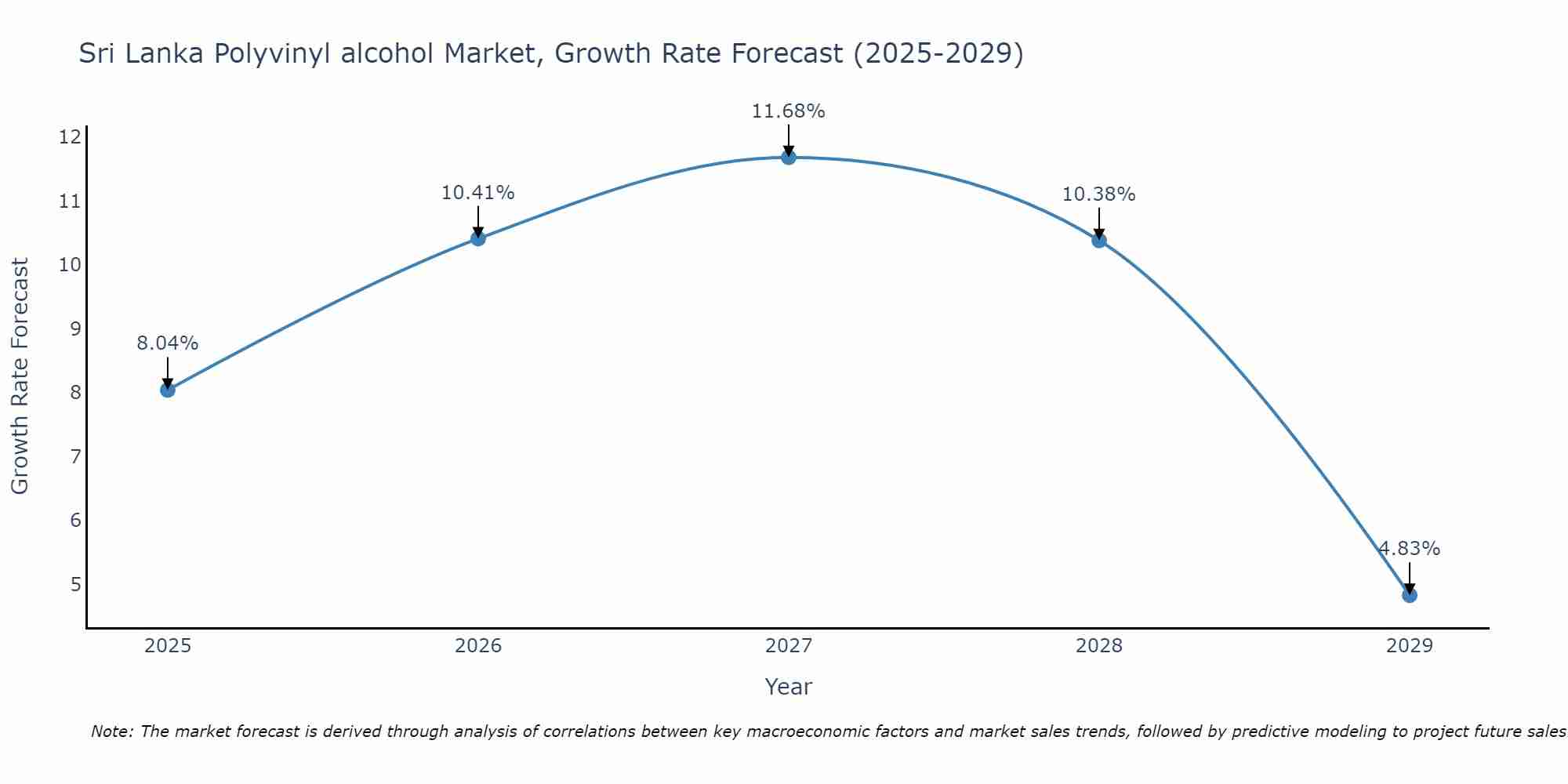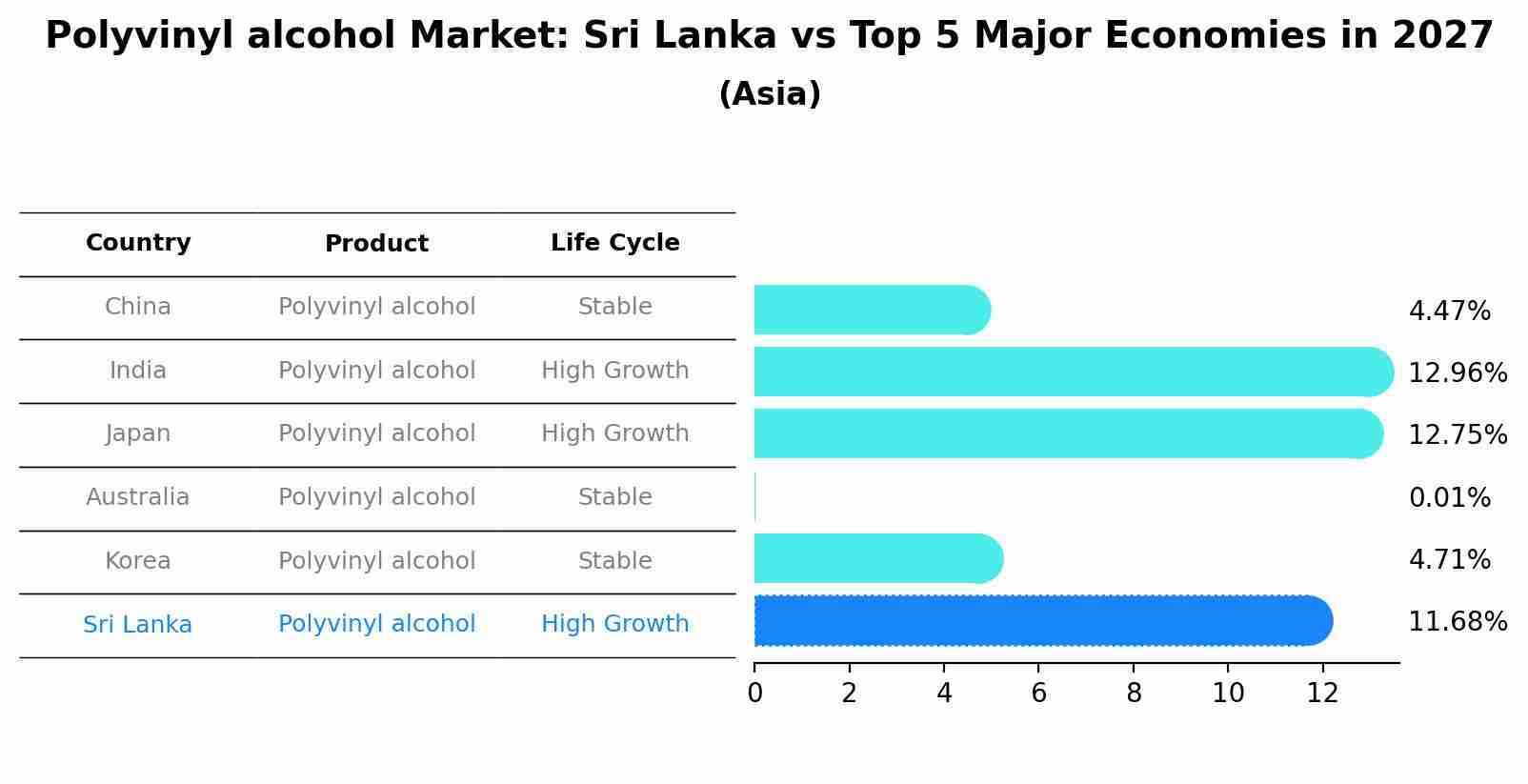Sri Lanka Polyvinyl alcohol Market (2025-2031) Outlook | Analysis, Share, Growth, Value, Companies, Size, Trends, Forecast, Industry & Revenue
| Product Code: ETC092090 | Publication Date: Jun 2021 | Updated Date: Jun 2025 | Product Type: Report | |
| Publisher: 6Wresearch | Author: Bhawna Singh | No. of Pages: 70 | No. of Figures: 35 | No. of Tables: 5 |
Sri Lanka Polyvinyl alcohol Market Size Growth Rate
The Sri Lanka Polyvinyl alcohol Market is projected to witness mixed growth rate patterns during 2025 to 2029. Starting at 8.04% in 2025, the market peaks at 11.68% in 2027, and settles at 4.83% by 2029.

Polyvinyl alcohol Market: Sri Lanka vs Top 5 Major Economies in 2027 (Asia)
Sri Lanka's Polyvinyl alcohol market is anticipated to experience a high growth rate of 11.68% by 2027, reflecting trends observed in the largest economy China, followed by India, Japan, Australia and South Korea.

Sri Lanka Polyvinyl alcohol Market Overview
The Sri Lanka Polyvinyl alcohol (PVA) market is experiencing steady growth driven by its versatile applications in industries such as textiles, packaging, construction, and pharmaceuticals. PVA is widely used as a polymer in the country due to its excellent film-forming properties, adhesion strength, and biodegradability. The increasing demand for PVA in the textile industry for sizing agents and as a binder in paper and packaging materials is a key factor contributing to market growth. Moreover, the construction sector`s use of PVA as a cement modifier and in the production of construction chemicals further propels market expansion. With a focus on sustainable and eco-friendly products, PVA`s biodegradable nature aligns well with shifting consumer preferences, driving its adoption in various sectors in Sri Lanka.
Sri Lanka Polyvinyl alcohol Market Trends
The Sri Lanka Polyvinyl alcohol (PVA) market is experiencing steady growth due to increasing demand from various end-use industries such as textiles, construction, packaging, and adhesives. The growing construction sector in Sri Lanka is driving the demand for PVA in the production of construction materials such as cement and concrete additives. Additionally, the textile industry is utilizing PVA in the manufacturing of fibers and textiles, further fueling market growth. Manufacturers are focusing on product innovations and sustainability to meet the evolving consumer preferences and stringent environmental regulations. The market is also witnessing a rise in investments in research and development activities to develop enhanced PVA products with improved performance characteristics, which is expected to drive further market growth in the coming years.
Sri Lanka Polyvinyl alcohol Market Challenges
The Sri Lanka Polyvinyl alcohol market faces several challenges, including fluctuating raw material prices, limited domestic production capacity, and strong competition from imported PVA products. The country`s reliance on imports for raw materials can lead to increased production costs, affecting the overall competitiveness of local PVA manufacturers. Additionally, the lack of advanced technology and equipment in the manufacturing process hinders the quality and efficiency of production. Furthermore, the market is susceptible to global economic uncertainties and trade restrictions, impacting the supply chain and pricing dynamics. To overcome these challenges and enhance market growth, Sri Lanka`s PVA industry must focus on improving production capabilities, investing in research and development, and fostering strategic partnerships with international suppliers for stable and cost-effective raw material sourcing.
Sri Lanka Polyvinyl alcohol Market Investment Opportunities
In the Sri Lankan Polyvinyl alcohol market, there are several investment opportunities for potential investors. With the increasing demand for Polyvinyl alcohol in various industries such as textiles, construction, packaging, and electronics, there is a growing market for this versatile polymer. Investors can consider opportunities in manufacturing and supplying Polyvinyl alcohol to meet the rising demand from these sectors. Additionally, investing in research and development for innovative applications of Polyvinyl alcohol can also offer lucrative returns. Collaborating with local manufacturers or establishing partnerships with key players in the Sri Lankan market can further enhance investment prospects. Overall, the Sri Lankan Polyvinyl alcohol market presents promising opportunities for investors looking to capitalize on the growing demand for this essential chemical compound.
Sri Lanka Polyvinyl alcohol Market Government Policy
The Sri Lankan government does not have specific policies targeting the polyvinyl alcohol market. However, the country`s overall industrial policies, trade regulations, and environmental laws may impact the production and trade of polyvinyl alcohol. Sri Lanka`s Board of Investment (BOI) provides incentives and support for foreign and domestic investors in various industries, which could indirectly benefit the polyvinyl alcohol sector. Additionally, the government`s commitment to sustainable development and environmental protection may influence regulations concerning the production and disposal of polyvinyl alcohol to ensure compliance with environmental standards. Overall, while there are no specific policies directly addressing the polyvinyl alcohol market, various government regulations and incentives may impact the industry within the broader business environment in Sri Lanka.
Sri Lanka Polyvinyl alcohol Market Future Outlook
The future outlook for the Sri Lanka Polyvinyl alcohol (PVA) market appears promising, driven by increasing demand from various end-use industries such as textiles, construction, packaging, and electronics. The growing emphasis on sustainable and eco-friendly products is expected to further boost the adoption of PVA due to its biodegradable nature and versatile properties. Additionally, the government`s initiatives to promote industrial growth and investments in infrastructure development are likely to create opportunities for market expansion. However, challenges such as fluctuating raw material prices and competition from alternative materials may hinder the market growth to some extent. Overall, with the rising demand for PVA in different applications and ongoing technological advancements, the Sri Lanka PVA market is anticipated to witness steady growth in the coming years.
Key Highlights of the Report:
- Sri Lanka Polyvinyl alcohol Market Outlook
- Market Size of Sri Lanka Polyvinyl alcohol Market, 2021
- Forecast of Sri Lanka Polyvinyl alcohol Market, 2031
- Historical Data and Forecast of Sri Lanka Polyvinyl alcohol Revenues & Volume for the Period 2021 - 2031
- Sri Lanka Polyvinyl alcohol Market Trend Evolution
- Sri Lanka Polyvinyl alcohol Market Drivers and Challenges
- Sri Lanka Polyvinyl alcohol Price Trends
- Sri Lanka Polyvinyl alcohol Porter's Five Forces
- Sri Lanka Polyvinyl alcohol Industry Life Cycle
- Historical Data and Forecast of Sri Lanka Polyvinyl alcohol Market Revenues & Volume By Grade for the Period 2021 - 2031
- Historical Data and Forecast of Sri Lanka Polyvinyl alcohol Market Revenues & Volume By Partially Hydrolyzed for the Period 2021 - 2031
- Historical Data and Forecast of Sri Lanka Polyvinyl alcohol Market Revenues & Volume By Fully Hydrolyzed for the Period 2021 - 2031
- Historical Data and Forecast of Sri Lanka Polyvinyl alcohol Market Revenues & Volume By End-use Industry for the Period 2021 - 2031
- Historical Data and Forecast of Sri Lanka Polyvinyl alcohol Market Revenues & Volume By Food Packaging for the Period 2021 - 2031
- Historical Data and Forecast of Sri Lanka Polyvinyl alcohol Market Revenues & Volume By Textile for the Period 2021 - 2031
- Historical Data and Forecast of Sri Lanka Polyvinyl alcohol Market Revenues & Volume By Paper for the Period 2021 - 2031
- Historical Data and Forecast of Sri Lanka Polyvinyl alcohol Market Revenues & Volume By Medical for the Period 2021 - 2031
- Historical Data and Forecast of Sri Lanka Polyvinyl alcohol Market Revenues & Volume By Construction for the Period 2021 - 2031
- Historical Data and Forecast of Sri Lanka Polyvinyl alcohol Market Revenues & Volume By Electronics for the Period 2021 - 2031
- Sri Lanka Polyvinyl alcohol Import Export Trade Statistics
- Market Opportunity Assessment By Grade
- Market Opportunity Assessment By End-use Industry
- Sri Lanka Polyvinyl alcohol Top Companies Market Share
- Sri Lanka Polyvinyl alcohol Competitive Benchmarking By Technical and Operational Parameters
- Sri Lanka Polyvinyl alcohol Company Profiles
- Sri Lanka Polyvinyl alcohol Key Strategic Recommendations
Frequently Asked Questions About the Market Study (FAQs):
- Single User License$ 1,995
- Department License$ 2,400
- Site License$ 3,120
- Global License$ 3,795
Search
Thought Leadership and Analyst Meet
Our Clients
Related Reports
- Germany Breakfast Food Market (2026-2032) | Industry, Share, Growth, Size, Companies, Value, Analysis, Revenue, Trends, Forecast & Outlook
- Australia Briquette Market (2025-2031) | Growth, Size, Revenue, Forecast, Analysis, Trends, Value, Share, Industry & Companies
- Vietnam System Integrator Market (2025-2031) | Size, Companies, Analysis, Industry, Value, Forecast, Growth, Trends, Revenue & Share
- ASEAN and Thailand Brain Health Supplements Market (2025-2031) | Strategy, Consumer Insights, Analysis, Investment Trends, Opportunities, Growth, Size, Share, Industry, Revenue, Segments, Value, Segmentation, Supply, Forecast, Restraints, Outlook, Competition, Drivers, Trends, Demand, Pricing Analysis, Competitive, Strategic Insights, Companies, Challenges
- ASEAN Bearings Market (2025-2031) | Strategy, Consumer Insights, Analysis, Investment Trends, Opportunities, Growth, Size, Share, Industry, Revenue, Segments, Value, Segmentation, Supply, Forecast, Restraints, Outlook, Competition, Drivers, Trends, Demand, Pricing Analysis, Competitive, Strategic Insights, Companies, Challenges
- Europe Flooring Market (2025-2031) | Outlook, Share, Industry, Trends, Forecast, Companies, Revenue, Size, Analysis, Growth & Value
- Saudi Arabia Manlift Market (2025-2031) | Outlook, Size, Growth, Trends, Companies, Industry, Revenue, Value, Share, Forecast & Analysis
- Uganda Excavator, Crane, and Wheel Loaders Market (2025-2031) | Strategy, Consumer Insights, Analysis, Investment Trends, Opportunities, Growth, Size, Share, Industry, Revenue, Segments, Value, Segmentation, Supply, Forecast, Restraints, Outlook, Competition, Drivers, Trends, Demand, Pricing Analysis, Competitive, Strategic Insights, Companies, Challenges
- Rwanda Excavator, Crane, and Wheel Loaders Market (2025-2031) | Strategy, Consumer Insights, Analysis, Investment Trends, Opportunities, Growth, Size, Share, Industry, Revenue, Segments, Value, Segmentation, Supply, Forecast, Restraints, Outlook, Competition, Drivers, Trends, Demand, Pricing Analysis, Competitive, Strategic Insights, Companies, Challenges
- Kenya Excavator, Crane, and Wheel Loaders Market (2025-2031) | Strategy, Consumer Insights, Analysis, Investment Trends, Opportunities, Growth, Size, Share, Industry, Revenue, Segments, Value, Segmentation, Supply, Forecast, Restraints, Outlook, Competition, Drivers, Trends, Demand, Pricing Analysis, Competitive, Strategic Insights, Companies, Challenges
Industry Events and Analyst Meet
Whitepaper
- Middle East & Africa Commercial Security Market Click here to view more.
- Middle East & Africa Fire Safety Systems & Equipment Market Click here to view more.
- GCC Drone Market Click here to view more.
- Middle East Lighting Fixture Market Click here to view more.
- GCC Physical & Perimeter Security Market Click here to view more.
6WResearch In News
- Doha a strategic location for EV manufacturing hub: IPA Qatar
- Demand for luxury TVs surging in the GCC, says Samsung
- Empowering Growth: The Thriving Journey of Bangladesh’s Cable Industry
- Demand for luxury TVs surging in the GCC, says Samsung
- Video call with a traditional healer? Once unthinkable, it’s now common in South Africa
- Intelligent Buildings To Smooth GCC’s Path To Net Zero


















